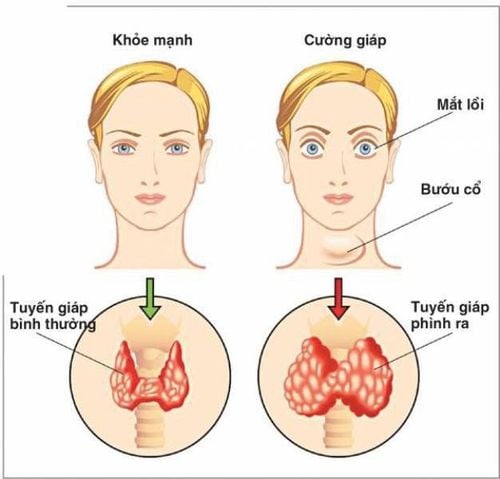This article is professionally consulted by Dr. Đỗ Xuân Chiến, MD, Master’s Degree – Department of General Medicine and Internal Medicine, Vinmec Ha Long International General Hospital.
Stress not only damages the nervous system but can also impact the thyroid gland, potentially causing hyperthyroidism. In recent years, hyperthyroidism has become significantly more prevalent, particularly among women.
1. What is hyperthyroidism?
Hyperthyroidism is a syndrome, meaning it is not a standalone disease. There are many diseases that cause this syndrome, with Basedow or Graves' disease being the most common. This disease is characterized by goiter (enlarged thyroid) and bulging eyes. Other causes include toxic nodular goiter and thyroiditis.
Hyperthyroidism occurs when the thyroid gland produces excessive amounts of thyroid hormones (triiodothyronine and thyroxine), leading to symptoms associated with an overly accelerated metabolism, such as tachycardia (rapid heartbeat) and unexplained weight loss.
Hyperthyroidism has various impacts on the body, but the most common symptoms are:
- Diarrhea: Increased intestinal peristalsis is a key reason why patients with hyperthyroidism often experience prolonged diarrhea.
- Goiter: Hyperthyroidism is a condition where the thyroid gland becomes enlarged. This causes the area around the neck, where the thyroid is located, to appear swollen.
- Hand Tremors: Tremors in the hands are difficult to control in hyperthyroidism patients, often occurring at high frequency and with smaller amplitude.
- Weight Loss: Hyperthyroidism often causes rapid weight loss, even though the patient’s diet remains unchanged. Patients should be attentive to this symptom.
- Sleep Disorders: Difficulty sleeping, short and restless sleep intervals are common among hyperthyroid patients.
- Fatigue, mood swings, and anxiety: Hyperthyroidism patients frequently experience extreme fatigue, lack of energy, and find it hard to exert themselves.

2. Chronic Stress Can Lead to Hyperthyroidism
According to statistics, the prevalence of hyperthyroidism is significantly lower in men compared to women, fueling the popular belief that it is a women's disease. It is most commonly seen in individuals aged 30–40 but can occur in the elderly. It is rare in those under 10 years old.
Stress is a significant risk factor for hyperthyroidism. Some individuals may develop this condition following stressful events, such as emotional trauma, accidents, or significant life changes. This is why the condition is often seen among workers in high-pressure environments, factory employees, people living far from home, and individuals with demanding professions.
Chronic stress can alter thyroid function by slowing the body’s metabolic processes, including the thyroid gland. Consequently, stress can contribute to weight gain and obesity. During periods of stress, thyroid hormone production can decrease, lowering levels of triiodothyronine (T3) and thyroxine (T4). Additionally, stress can disrupt the conversion of T4 to T3, leading to an elevation of T4 levels and triggering hyperthyroidism.
Moreover, stress also impacts the thyroid glands through the adrenal glands, which are responsible for managing the body’s response to stress. In times of stress, the adrenal glands release cortisol, a hormone that helps mitigate inflammation and stress. Elevated cortisol and glucocorticoid levels can suppress the production of thyroid-stimulating hormone (TSH), disturbing the balance of thyroid hormones and potentially worsening hyperthyroid symptoms.
Unlike iodine-induced hyperthyroidism, which can be diagnosed through urinary iodine levels, stress-related thyroid dysfunction is much harder to assess

Therefore, doctors recommend that individuals who experience symptoms such as: increased body temperature, fatigue, unexplained weight loss, limbs tremors, eye discomfort such as dryness, or watering, menstrual irregularities, decreased libido, digestive disorders, and in men, hypokalemia (which may manifest as temporary paralysis)... should consult an endocrinologist for diagnosis and evaluation.
3. Complications of Hyperthyroidism
If undetected or left untreated, hyperthyroidism can lead to serious complications, including:
3.1 Cardiovascular Complications
Tachycardia (fast heart rate) is common in hyperthyroid patients. More severe arrhythmias, such as atrial fibrillation, can also develop. If untreated, these conditions may lead to heart failure.
3.2 Thyroid Storm
In extreme cases where thyroid hormone levels elevate uncontrollably, hyperthyroidism may escalate rapidly, with symptoms becoming more severe. This can be life-threatening if not diagnosed and treated immediately.
3.3 Exophthalmos (Bulging Eyes)
In cases of hyperthyroidism due to Basedow or Graves’ disease, patients may experience exophthalmos (bulging eyes), accompanied by excessive tearing, light sensitivity, conjunctivitis and potential corneal damage.
4. Strategies to Reduce Stress and Prevent Hyperthyroidism
Here are some approaches to implement lifestyle changes that can help reduce chronic stress and support thyroid health:
4.1 Healthy Eating
A balanced diet rich in vegetables, fruits, carbohydrates, and proteins is essential. Reducing alcohol, caffeine, and sugar intake can help regulate energy levels and metabolism. Take time to enjoy meals, as this can enhance digestion and overall well-being.
4.2 Adequate Vitamin and Mineral Intake
Ensure adequate intake of vitamins and minerals, including selenium, zinc, iron, and vitamins A, B, C, and E,....
4.3 Sufficient Sleep
Sleep deprivation can exacerbate symptoms of hyperthyroidism. Although stress can make it difficult to sleep, a restful night’s sleep is crucial for thyroid function. Avoid electronic devices before bedtime and engage in relaxation techniques such as meditation or yoga to promote better sleep.

4.4 Physical Activity
Exercise can reduce stress by lowering cortisol levels, which are produced by the adrenal glands in response to stress. Regular physical activity helps manage anxiety and stress, benefiting overall thyroid health.
4.5 Entertainment
Research from Loma Linda University (USA) suggests that watching a humorous video can reduce cortisol epinephrine levels, but increase endorphins levels. This method can promote a positive mood, improve immune function, prevent depressive episodes and relieve stress.
4.6 Massage Therapy
Massage not only helps relax the muscles but also positively affects hormone levels. Studies from Cedars-Sinai Medical Center in Los Angeles (USA) show that a 45-minute massage session can lower cortisol levels, a “stress hormone”, and reduce vasopressin, a hormone associated with aggressive or confrontational behaviors.
Thyroid disorders are often overlooked, with 20% - 60% of cases remaining undiagnosed. This is why Vinmec International General Hospital has introduced a screening package for thyroid diseases. Early detection of common thyroid disorders, including goiter, hyperthyroidism, hypothyroidism, thyroiditis, thyroid nodules, and thyroid cancer, allows for timely intervention and appropriate treatment.
To arrange an appointment, please call HOTLINE or make your reservation directly HERE. You may also download the MyVinmec app to schedule appointments faster and manage your reservations more conveniently.













